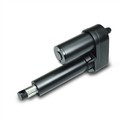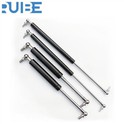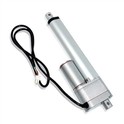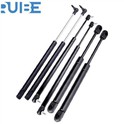Hey there! As a supplier of lockable gas springs, I've seen my fair share of issues that customers run into. Lockable gas springs are super handy in a bunch of applications, like Salon Chair Gas Spring, Massage Chair Lockable Gas Spring, and Gas Spring for Office Chair. But they're not without their problems. Let's dive into some of the common ones.
Leakage
One of the most common problems with lockable gas springs is leakage. Gas springs work by having a sealed chamber filled with gas (usually nitrogen). If there's a leak, the gas can escape, and that messes up the spring's performance. You might notice that the chair or whatever it's attached to starts sinking slowly over time. That's a tell - tale sign of a leak.
There are a few reasons why leakage can happen. First off, the seals can wear out. Over time, constant movement and pressure can cause the rubber or plastic seals to degrade. Also, if the gas spring is exposed to harsh chemicals or extreme temperatures, it can damage the seals and lead to leaks. Sometimes, physical damage like dents or scratches on the cylinder can also create a path for the gas to escape.


Loss of Locking Function
The whole point of a lockable gas spring is to be able to lock it in a certain position. But sometimes, the locking mechanism just doesn't work as it should. You might find that you can't lock the spring at all, or it locks but then unlocks unexpectedly.
This problem can stem from a few things. The locking mechanism itself might be poorly designed or manufactured. If the parts are not precision - made, they won't fit together properly, and the lock won't engage or disengage smoothly. Another reason could be dirt or debris getting into the locking mechanism. If there's gunk in there, it can jam the parts and prevent the lock from working correctly.
Insufficient Force
Each gas spring is rated for a certain amount of force. If the force is insufficient, the gas spring won't be able to support the load it's supposed to. For example, in an office chair, if the gas spring doesn't have enough force, the chair won't be able to stay up when a person sits on it.
This can be due to incorrect sizing. If you choose a gas spring with a lower force rating than what's required for the application, you're going to run into problems. Sometimes, the gas pressure inside the spring can drop over time, reducing the force it can exert. And if the gas spring is overloaded regularly, it can also lead to a decrease in the available force.
Noise Issues
No one likes a noisy gas spring. You might hear squeaking, rattling, or popping sounds when the gas spring is in use. This can be really annoying, especially in a quiet environment like an office or a massage parlor.
The noise can come from several sources. Loose parts are a common culprit. If there are parts inside the gas spring that aren't tightly secured, they can move around and create noise when the spring is extended or retracted. Friction between the moving parts can also cause squeaking. This can happen if the lubrication inside the spring wears off or if the surfaces are rough.
Corrosion
Corrosion is a big problem, especially for gas springs that are used in humid or wet environments. If the metal parts of the gas spring start to corrode, it can weaken the structure and lead to other problems.
When corrosion sets in, it can eat away at the cylinder, making it thinner and more prone to leaks. It can also affect the moving parts, causing them to stick or not move smoothly. This is why it's important to choose gas springs with proper corrosion - resistant coatings, especially if they're going to be used outdoors or in damp areas.
Premature Failure
Sometimes, a gas spring just fails prematurely. It might stop working after only a short period of use. This can be really frustrating, especially if you've invested in a quality product.
Premature failure can be caused by a combination of factors. Poor quality materials are a major one. If the manufacturer uses sub - standard steel or other materials, the gas spring won't be as durable. Overloading the gas spring can also lead to premature failure. If it's constantly pushed beyond its limits, the internal components will wear out much faster.
Inconsistent Movement
You expect a gas spring to move smoothly and consistently. But sometimes, you might notice jerky or uneven movement. The spring might start and stop suddenly, or it might move faster in one direction than the other.
This can be due to a problem with the internal valve. The valve controls the flow of gas in and out of the cylinder, and if it's not working properly, the movement will be affected. Also, if there's air trapped inside the gas spring, it can cause inconsistent movement. Air bubbles can disrupt the smooth flow of the gas and make the spring act erratically.
Solutions and Prevention
Now that we've talked about the problems, let's look at some solutions and ways to prevent these issues.
For leakage, regular inspection is key. Check the gas springs periodically for signs of wear on the seals and any physical damage. If you notice a leak early, you might be able to replace the seals before it gets worse. Also, make sure to use gas springs in the right environment and avoid exposing them to harsh conditions.
To prevent loss of locking function, keep the locking mechanism clean. You can use a soft brush or compressed air to blow out any dirt or debris. If the problem persists, it might be necessary to replace the locking mechanism or the whole gas spring.
When it comes to insufficient force, always make sure to choose the right size and force rating for your application. Read the manufacturer's guidelines carefully and don't overload the gas spring. If the force drops over time, you might need to replace the gas spring.
To deal with noise issues, lubricate the moving parts regularly. You can use a silicone - based lubricant to reduce friction. Tighten any loose parts to eliminate rattling.
For corrosion, choose gas springs with a good anti - corrosion coating. If the gas spring is used in a wet environment, you can also apply additional protective coatings.
To prevent premature failure, buy from a reputable supplier. A good supplier will use high - quality materials and have strict quality control measures. And of course, don't overload the gas spring.
For inconsistent movement, if there's air trapped inside, you might be able to bleed the gas spring according to the manufacturer's instructions. If the valve is the problem, it might need to be replaced.
As a supplier of lockable gas springs, I understand how frustrating these problems can be. That's why we take great care in manufacturing our products. We use high - quality materials, precision - manufacturing processes, and rigorous quality control to minimize these issues.
If you're facing any of these problems with your gas springs or if you're in the market for new ones, don't hesitate to get in touch. We can help you choose the right gas spring for your specific application and offer solutions if you're having problems with your existing ones. Whether it's for a Salon Chair Gas Spring, Massage Chair Lockable Gas Spring, or Gas Spring for Office Chair, we've got you covered.
References
- Gas Spring Handbook, Industry Standard Publication
- Manufacturer's Guides on Lockable Gas Springs
- Research on Gas Spring Performance and Failure Modes






